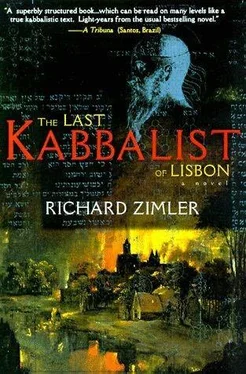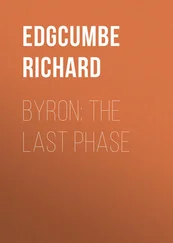Richard Zimler - The Last Kabbalist of Lisbon
Здесь есть возможность читать онлайн «Richard Zimler - The Last Kabbalist of Lisbon» весь текст электронной книги совершенно бесплатно (целиком полную версию без сокращений). В некоторых случаях можно слушать аудио, скачать через торрент в формате fb2 и присутствует краткое содержание. Год выпуска: 1998, Издательство: Arcadia Books, Жанр: roman, Исторический детектив, Философия, на английском языке. Описание произведения, (предисловие) а так же отзывы посетителей доступны на портале библиотеки ЛибКат.
- Название:The Last Kabbalist of Lisbon
- Автор:
- Издательство:Arcadia Books
- Жанр:
- Год:1998
- ISBN:нет данных
- Рейтинг книги:5 / 5. Голосов: 1
-
Избранное:Добавить в избранное
- Отзывы:
-
Ваша оценка:
- 100
- 1
- 2
- 3
- 4
- 5
The Last Kabbalist of Lisbon: краткое содержание, описание и аннотация
Предлагаем к чтению аннотацию, описание, краткое содержание или предисловие (зависит от того, что написал сам автор книги «The Last Kabbalist of Lisbon»). Если вы не нашли необходимую информацию о книге — напишите в комментариях, мы постараемся отыскать её.
The Last Kabbalist of Lisbon — читать онлайн бесплатно полную книгу (весь текст) целиком
Ниже представлен текст книги, разбитый по страницам. Система сохранения места последней прочитанной страницы, позволяет с удобством читать онлайн бесплатно книгу «The Last Kabbalist of Lisbon», без необходимости каждый раз заново искать на чём Вы остановились. Поставьте закладку, и сможете в любой момент перейти на страницу, на которой закончили чтение.
Интервал:
Закладка:
The poor, to dispel their hunger pangs, had taken to eating a mash of linen fibers and water.
I had just turned twenty years old. Proof that I was a little too devout for my own good was my belief that our city had been gifted generously with the stark significance of Torah. To me, there was a terrible, timeless beauty and horror to everything. Even the filthy feet of the recently deceased sticking out from the burlap of their sour-smelling plague carts possessed a sad and reverent grace. For they made our thoughts turn to Man’s mortality and our covenant with God.
Only Uncle Abraham had the confidence to disregard completely the goat-ribbed preachers roaming the streets screeching that God had abandoned Portugal and that the end of the world was but five weeks away (though it could be postponed, they noted, if we were generous with our handouts of copper coinage). With an irritated frown, he had told me, “Don’t you think that the Lord would show me a sign if He were about to close the last gate upon the Lower Realms?”
Father Carlos, a priest and family friend, could not yet be counted among those unfortunates who’d succumbed completely to the insanity gripping the city. But it seemed only a matter of days. “Drought and plague … they are the Devil’s twin birth!” he told me in a conspirator’s whisper as we stood in the archway of St. Peter’s Church.
I had brought my little brother, Judah, to him that morning for religious instruction in the ways of Christianity. The three of us were watching a candlelight procession of flagellants whipping their backs with leather scourges whose ends trailed wax balls laced with filings of tin and splinters of colored glass. Behind them marched friars from Lisbon’s monasteries unfurling blue and yellow pennons sewn with images of the Nazarene crucified. At the rear, proud-postured guildmen in flowing, silken fineries hoisted up litters bearing effigies of saints.
Crowds had gathered to watch, lined both sides of the street, formed two ragged ribbons against the dusty white façades of the town-houses as far as the cathedral. Shouts for water and mercy rang up like antiphonal choruses. All the variety of our town was there: horsemen and peasants, whores and nuns, beggars and black slaves—even blue-eyed sailors from the north.
Waifs and barking dogs suddenly began running past Father Carlos, Judah and me to the west to keep up with the moving spectacle. The priest closed his eyes, murmured nervous prayers. I inhaled deeply on the chilly perfume of danger in the air. And tonight, I thought, into the unpredictable currents of this sea of madness, we will be launching the forbidden ship of Passover. Yes, our celebrations should have started exactly one week earlier. But most of the secret Jews, including our family, had postponed Passover in the hopes of sailing safely through the tainted waters of Old Christian gossip around us.
A filthy, mop-haired woodcutter standing near us suddenly screamed at the top of his lungs, “For heavenly rain, we must have more blood! Lisbon must be the Venice of blood!
Judah pressed back against my legs, and I gripped his shoulder. Father Carlos rubbed his hands over his domed forehead, as if in defense. He was a corpulent man, squat, with soft, pale skin, a bulbous nose, webs of red veins on both his cheeks from too much drink. Few people took him seriously, but I found him a good friend. His droopy eyes settled on me. He said, “Men like nothing more than profaning the sacred, my boy.”
I was suddenly laden with sadness for our fate. The scent of Indian pepper turned me around, and blood splattered across my pants and Judah’s face. A shrieking initiate had pulled skin loose from his shoulder blade, was spraying spices over himself to capture the sting of God’s love. In my brother’s terrified eyes, I believed I recognized the look of a Hebrew child about to flee across the Red Sea. A fleeting premonition, unusual in its certainty, shook me: We Jews of Lisbon have waited too long to re-enact the Exodus, and Pharaoh has learned of our escape plans.
As I came to myself, Carlos hid his gaze in the wing of his cape, whisper-screamed, “That young initiate’s moans…you can hear the wailing of the Devil’s children in them!”
Judah was looking up at me with stunned, breathless curiosity. When tears caressed his eyes, I picked him up, wiped him, tousled the thick locks of his coal-black hair. He hugged his arms around my neck. “Thanks ever so much,” I told Carlos. “Between you and these madmen, I think we’ve had all the religious instruction we need for today.”
I lifted the woolen hood of Judah’s mantle over his head and patted him as he sobbed and sniffled. After the last penitent had dragged himself past our former synagogue, Carlos led us across the square. At the corner was our house, a single story of whitewashed stucco whose rectangular perimeter was traced with a rim of deep blue. An affinity between colors lifted my gaze to the gauzy turquoise of the dawn sky, then down to the spine of the roof, a horizon of mottled fawn-colored tile pierced near its center by our chimney, a soot-blackened white cone notched with air-holes. From its point rose the tin silhouette of a troubadour pointing east, toward Jerusalem. Thin scarfs of smoke from our hearth were wafting around him and unraveling into the southerly breeze leading toward the river. “Just as well we cancel our lessons today,” Carlos said as I pulled open the gate of iron tracery that served both our home and the house belonging to my beloved friend Farid and his father. “I’ve got some unhappy business I’ve been putting off with your uncle.”
We stepped into the secret landscape of our courtyard. Enclosed by white façades and walls, paved with gray slate, it was centered by a venerable lemon tree circled by oleander bushes. Farid was standing on his stoop in his long underwear, barefoot, combing his hands back through the black locks falling to his shoulders. To me, he had always seemed gifted with all the attributes of a warrior poet of the Arabian desert—a slim, muscular build, sharp green, hawklike eyes, soft olive skin and an agile, unpredictable intelligence. The stubble he always left on his cheeks made him look sleepy but seductive, and men and women alike were often captivated by his dark beauty. Now, he signalled good morning to me with a twist to the forceful hands he’d developed as a weaver of rugs. Though deaf and mute from birth, he’d never had the least difficulty making himself understood to me in this way; as toddlers, we’d developed a language of gestured signs, undoubtedly because we were born just two days apart and grew up holding hands.
Returning my friend’s greeting, I led Father Carlos to the kitchen door, an ogival threshold exuberantly marked with a rim of green and rust mosaic stars. In a doubtful voice, he said, “Might as well get it over with.”
Can a house possess a body, a soul? Ours was bent and fatigued from centuries of rain and sun, but fiercely protective of its residents.
As manuscript illuminators, Uncle Abraham and I had often modeled biblical dwellings on our home. For its walls we applied a milky ceruse, and to approximate the low and sagging chestnut wood ceilings which creaked alarmingly during the rains of Av and Tishri, we applied the rich brown made from vinegar, silver filings, honey and alum. The sandy floor tiles which scratched one’s feet were given a moderated vermillion obtained from a marriage of quicksilver and sulphur.
Cracked foundations sloped the floors toward Mother’s tidy bedroom at the sunset side of the house, little more than a corridor but with the advantage of an entrance to Temple Street for her sewing clients. Facing sunrise was my aunt and uncle’s cozy, light-filled chamber. Between the two were the kitchen, centered by the great oaken table around which our lives passed, and the bedroom I share with Judah and my little sister, Cinfa. Our fruit store, added on two centuries ago judging from the masonry, jutted out from this room toward Temple Street.
Читать дальшеИнтервал:
Закладка:
Похожие книги на «The Last Kabbalist of Lisbon»
Представляем Вашему вниманию похожие книги на «The Last Kabbalist of Lisbon» списком для выбора. Мы отобрали схожую по названию и смыслу литературу в надежде предоставить читателям больше вариантов отыскать новые, интересные, ещё непрочитанные произведения.
Обсуждение, отзывы о книге «The Last Kabbalist of Lisbon» и просто собственные мнения читателей. Оставьте ваши комментарии, напишите, что Вы думаете о произведении, его смысле или главных героях. Укажите что конкретно понравилось, а что нет, и почему Вы так считаете.












